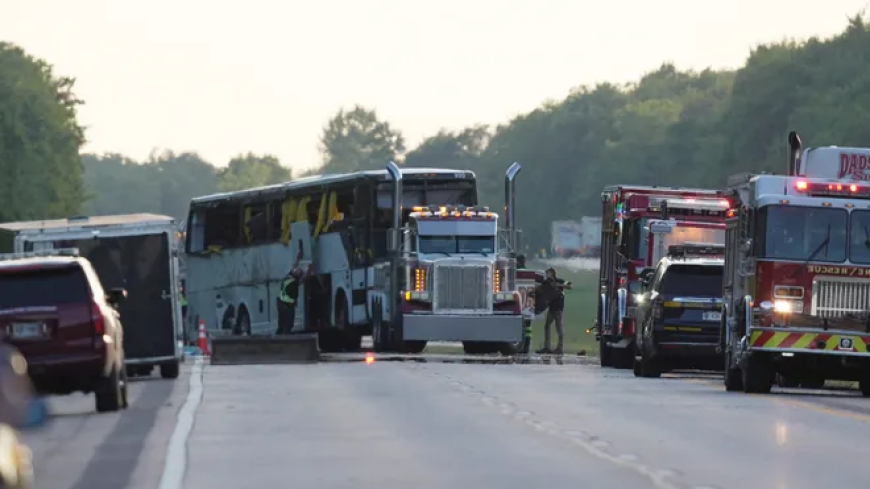Survivors' Hidden Struggles: Mental Health Impacts of the New York Thruway Bus Crash
Survivors of the New York Thruway bus crash face hidden psychological struggles. Exclusive interviews reveal trauma, community responses, and policy challenges.

New York — The New York Thruway crash earlier this month continues to reverberate far beyond the immediate loss of life and injuries. While investigators remain focused on mechanical failures and driver accountability, the quieter, more enduring toll is unfolding in living rooms and hospital wards across rural New York. Survivors and their families are now facing the long shadow of trauma, with mental health experts warning that the full scope of psychological damage may not be known for years.
A Crash That Changed Lives in Seconds
On the evening of Monday, August 11, a charter bus carrying 47 passengers overturned near Exit 23 on the Thruway. Three passengers were killed, and dozens were hospitalized with fractures, spinal injuries, and concussions. Initial headlines centered on rescue efforts and the investigation, but as the days passed, new realities emerged: sleepless nights, flashbacks, and anxiety symptoms that survivors say feel just as debilitating as their physical wounds.
“I wake up hearing the sound of glass breaking,” said 29-year-old survivor Angela Ruiz, who was seated in the middle of the bus. “Everyone talks about the crash itself, but nobody asks what happens after you walk out of the hospital. That’s when the struggle really begins.”
Trauma Beyond the Physical
Mental health specialists caution that motor vehicle crashes—especially mass casualty events—often spark post-traumatic stress disorder (PTSD). Dr. Harold Manning, a trauma psychologist at Albany Medical Center, told NewsSutra that untreated psychological injuries can spiral into long-term depression, substance abuse, or strained family relationships.
“These survivors experienced not only a violent accident but also a collective trauma,” Manning explained. “The brain processes it differently when you’re surrounded by chaos, screaming, and death. It creates a communal form of PTSD that ripples outward into families and communities.”
A National Institute of Mental Health study shows that crash survivors face a 25–30% higher risk of developing chronic PTSD compared to other accident victims, especially when the incident occurs in a group setting.
Family Members Caught in the Wake
For some, the mental toll isn’t limited to those on the bus. Families waiting by phones, emergency rooms, and morgues that night now carry their own scars. Linda Warren, whose husband survived with minor injuries, described how her teenage children are refusing to travel by bus again.
“It’s not just his trauma. It’s the whole family,” Warren said. “Every time we see a bus on the road, my daughter grabs my hand like she’s five years old again. We’re living with invisible wounds.”
Rural Communities and Limited Resources
Unlike urban centers where trauma counseling is more accessible, survivors in small towns north of Albany face limited options. Several families reported waiting weeks for mental health appointments. A community church in Schroon Lake has stepped in, hosting informal support circles twice a week.
Pastor Robert Jenkins, who leads the sessions, said attendance has steadily grown. “We started with three families,” he said. “Now we’re at nearly twenty people. It shows how deep this need runs.”
The situation mirrors findings from a RAND Corporation report on rural healthcare, which highlighted the severe shortage of licensed trauma psychologists outside metropolitan areas. Without state intervention, many survivors may slip through the cracks.
Survivor Voices: Fighting for Normalcy
In exclusive interviews with NewsSutra, survivors described the psychological hurdles that remain hidden from public view.
-
Mark Ellison, 54, a retired firefighter, said he feels shame that despite his physical toughness, he panics when hearing loud noises. “It’s humiliating, but I can’t control it,” he admitted.
-
Kendra Li, 22, a college student, revealed she dropped out of her fall semester. “I can’t sit in a classroom without feeling trapped,” she said quietly.
-
James Ortiz, 38, who fractured his leg in the crash, said the mental battle is tougher than the physical rehab. “My leg will heal. I’m not sure about my mind,” he reflected.
Policy Questions Raised
Beyond individual recovery, the crash is sparking conversations among state legislators about whether emergency relief funds should cover long-term psychological care, not just immediate medical costs. Advocates argue that mental health must be seen as integral to public safety planning.
“If we only fix broken bones, we’re failing these survivors,” said state assemblywoman Claire Redding, who represents districts near the crash site. She announced plans to introduce a bill that would earmark additional funding for trauma counseling in rural New York counties.
Looking Forward
For the survivors and their families, the journey toward healing is ongoing, uncertain, and deeply personal. While the nation may remember the Thruway crash for its headline numbers—three lives lost, dozens injured—those living through it day by day know the story is far from over.
“This isn’t about statistics,” survivor Angela Ruiz said, her voice breaking. “It’s about trying to feel safe in your own skin again. That’s the hardest part.”











